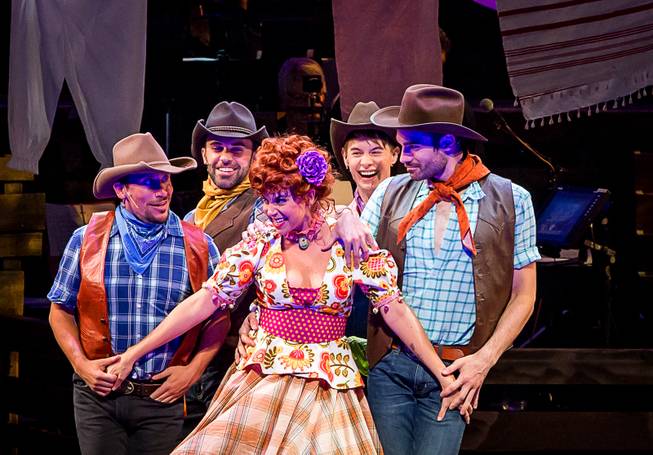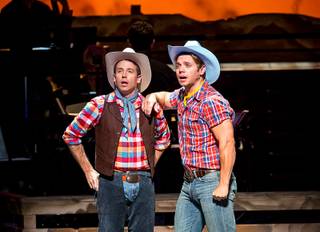
Erik Kabik Photography/ erikkabik.com
A scene from “Idaho! The Comedy Musical” at the Smith Center.
Published Tuesday, July 12, 2016 | 2 a.m.
Updated Tuesday, July 12, 2016 | 8:12 a.m.
Whip Masters, a master of taters who is whip-quick with a quip, put it best:
“Why, jist look a map. Idaho ain't like a lot of them new states that are just a rectangle,” he explains. “It's got that kinda sticky-up thing on the top of it. It's a state you can really grab onto!”
Indeed. And “Idaho! The Comedy Musical” is a production you can really grab onto.
The musical production of the Smith Center for the Performing Arts has formally opened at Reynolds Hall and plows ahead to a Sunday closing. Given the pedigree of co-writers Buddy Sheffield and Keith Thompson, we expected a lotta puns about taters delivered with a side of corn (so much so that a sister production could be named “Iowa!”).
But “Idaho!” is not merely a mash of spuds jokes. It boasts a sharp, smart fast-hitting script (from Sheffield, of “In Living Color” fame) and a score filled with inventive music and lyrics (from Sheffield’s writing partner, “Jersey Boys” music director Thompson, also known for his punny proclivities).
The show takes place in Angel Butte, renamed “Angel Butt” after the “E” tumbles from the town sign. The story centers on a love feud between resident spud stud Whip Masters (played with addled confidence by Nathaniel Hackman) and a potato-shaped tater magnate named Jed Strunk, portrayed with great grace and power by Paul Vogt (who a decade ago replaced Harvey Fierstein in the Las Vegas production of "Hairspray," which was also co-produced by Smith Center President Myron Martin). That character is a kick in the pants, especially for those who recall the finer performances of Jackie Gleason, the image Vogt brings to mind in his portrayal. The woman at the center is Cassie Purdy (Jessica Fontana), a luckless mail-order bride of Strunk who is intercepted by Masters in an attempt to fend off this ill-fated marriage. Playing another whimsically named character, Yank Daley, is Connor Russell (not Russet, sadly), late of "Babes in Arms" and "Light and Shadow" in New York.
Sideline love stories involve the promiscuous prairie princess Ida Dunham (Alex Ellis, performing with obvious zeal) whose repeated name references draw snickers from the crowd and who mentions one of her former beaus is named “Charlie Company.” She’s being pursued by Slim Johnson (Matt Loehr), whose very name indicates his trouble in capturing Ida’s affection. Prairie matriarch Aunt Pearlie (Jennifer Perry, reminding somewhat of Minnie Pearl from the Grand Ol’ Opry and “Hee Haw,” who was in "Mamma Mia!" in Las Vegas) is hooked up with Uncle Fate (Jay Rogers). Fate’s capacity for romancin’ was compromised by an unspecified “mining accident” that left him eligible to be arrested for “assault with a dead weapon.”
The requisite Native American character (Idaho is laden with American Indian tribal property and communities) is Mavis White Eagle (Carmen Ruby Floyd), who happens to be black and is just trying to blend in (she notes the other black people in town, Apache Tyrone and Shoshone Sheniqua).
The zingers are rolled out at high velocity, and the production continues to tighten all facets of the presentation — five minutes were trimmed from Act II of the first preview Wednesday night to Saturday’s premiere. The show’s rhythm holds the spirit of its affection to Mel Brooks’ movies (“Blazing Saddles” takes on “Oklahoma!” is the shorthand description of the show), where a dud spud is quickly supplanted by a winner.
But most of the material hits the mark. The show is loaded with great one-liners, as when Aunt Pearlie rebuffs Uncle Fate with, “Don't you git frisky with me. You know you can't back it up.” From Mavis, telling Cassie to keep the purported Indian woman’s ethnicity a secret, “You mind if we keep that between us? The underground railroad don’t stop in this neighborhood.” When Cassie tells Ida she is from a town in the “East,” Zanseville, Ohio, Ida says, “Sounds sophisticated!” Cassie says, “We had a telephone ... at the general store.” And Ida, impressed, responds, “Imagine that ... a general store.”
That is a very Idaho worldview, and one of the many moments in the show — including the observation about the design of the state’s borders — captured by Sheffield. And, director Matt Lenz enforced some character development — especially the evolution of Ida from a wild-west trollop to a measured, deep-feeling adult — that does not strip the script of its carefree humor.
Musically, the show is boosted by an orchestra directed by Thompson place onstage, and a personal-favorite moment where a #trombonesolo is interrupted by an impatient Mr. Fate. Where is the big-hit song, though? The “Oklahoma!” of the set? It’s the obvious attempt at such, “Idaho!” which ends Act I. That song sends the show into intermission with a full-audience sing-along. If there’s a hit to be had on any “Idaho!” soundtrack, it’s the title song.
Other remarkable scenes are the “Twister Ballet,” set to a convincing tornado re-creation with a spinning, blue-and-white fabric set piece (soiler, I mean, spoiler alert: This twister is where curly fries were discovered). Forget that Idaho is not a region of tornados; the scene is the inspired creation of the mind of Emmy Award-winning set designer Andy Walmsley, who also conceived the potato-styled full moon that hovers over Angel Butt in Act II.
We are reminded in this musical that Walmsley’s imagination is as fertile as the Gem State farms that annually produce millions of taters.
The tornado stretch aside, the musical does match the scenery and sensibility of the home state. Michele Lynch has caught the very dance moves of the hoedowns at the Bannock County and Eastern Idaho State Fairs. Fate’s coveralls and the Wranglers and leather vests worn by the guys — and prairie dresses of the ladies — are all fitting of the state and its late-1800s time stamp.
Yes, it helps to be a “Pocatella Fella” (hello) to appreciate such overt references as the four spuds on the pitchfork that opens the show, and the song about the state’s most cosmopolitan city, “Boise’s Just as Noisy as Kin Be!”
Or, this line delivered by Strunk, who is trying to pin a potato robbery on Masters: “A tater thief is the lowest of the low. Hang him!”
Hang him! Indeed! Potato thief …
As a production in the Broadway Las Vegas Series, “Idaho!” is as high in quality as anything we’ll see on the Reynolds Hall stage. The question is, will those who invest in shows to be delivered to Broadway — where theater availability is scant and timing is crucial — feel it is the right fit? Like the enduring potato itself, the palatability of “Idaho!” depends entirely on what you do with it.
Follow John Katsilometes on Twitter at twitter.com/JohnnyKats. Also, follow Kats on Instagram Instagram.com/JohnnyKats1.



Join the Discussion:
Check this out for a full explanation of our conversion to the LiveFyre commenting system and instructions on how to sign up for an account.
Full comments policy